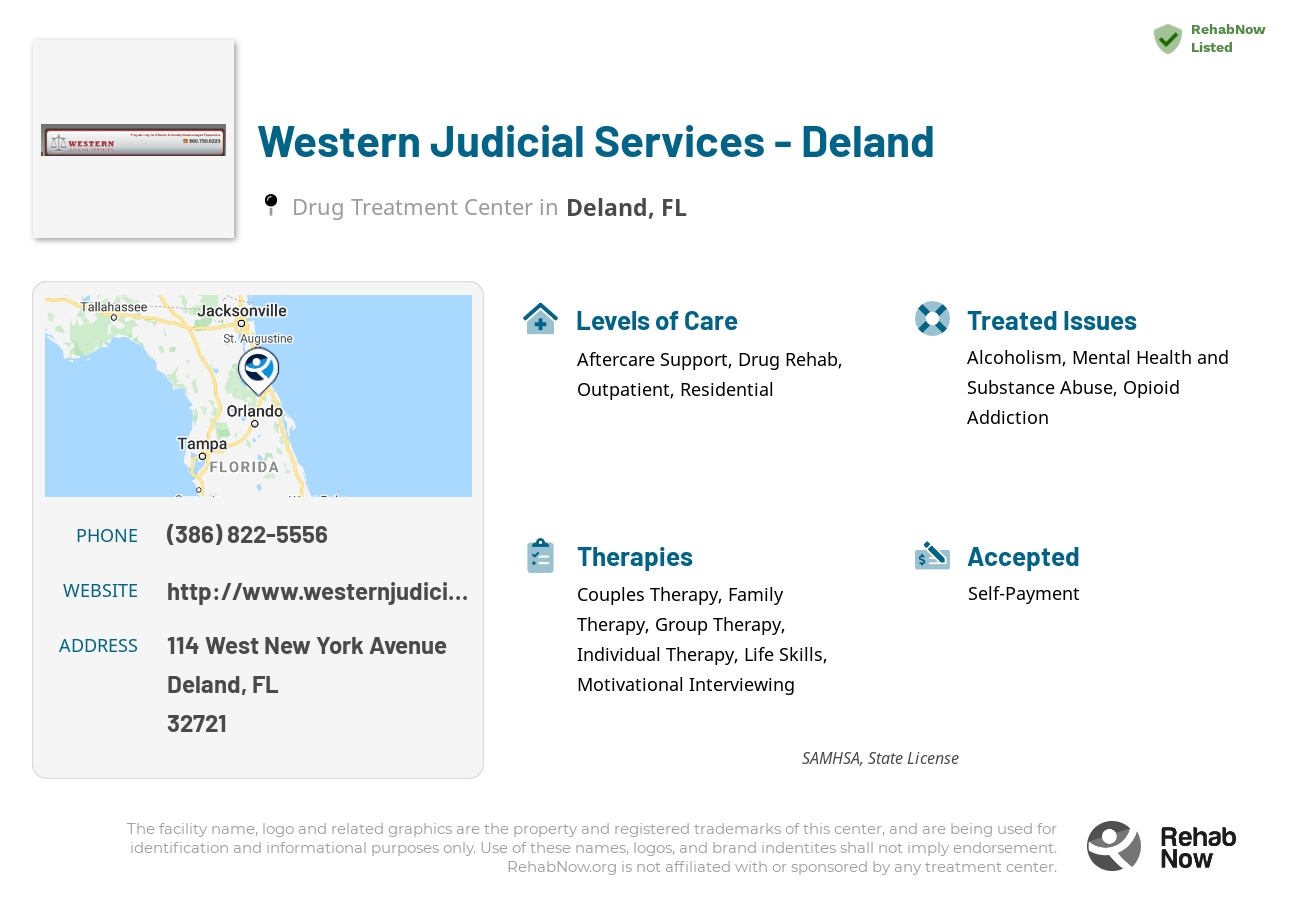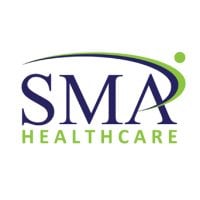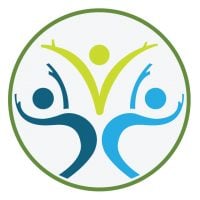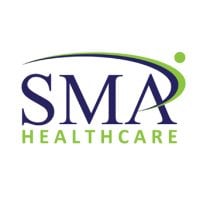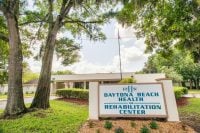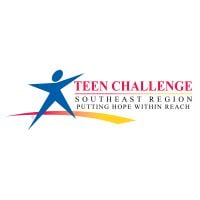About Western Judicial Services - Deland in Florida
Western Judicial Services - Deland is an addiction treatment facility located in Deland, Florida. Established in 1989, this treatment center focuses on providing support to individuals suffering from alcoholism, dual diagnosis, opioid addiction, and drug addiction. Western Judicial Services - Deland is accredited by SAMHSA and holds a state license, ensuring that their services meet the highest standards of quality and care. With a reputation for excellence, this facility offers a range of treatment options to address the unique needs of each client, including aftercare support, drug rehab, outpatient, and residential levels of care.
At Western Judicial Services - Deland, individuals struggling with addiction can find the help they need to overcome their substance abuse issues. This facility provides a comprehensive range of services to assist clients on their journey to recovery. Whether it is alcoholism, dual diagnosis, opioid addiction, or drug addiction, Western Judicial Services - Deland offers specialized treatment programs tailored to each individual's specific needs. Their services include aftercare support, drug rehab, outpatient, and residential levels of care. With a focus on personalized care and evidence-based practices, Western Judicial Services - Deland is dedicated to helping individuals reclaim their sobriety and live healthier, more fulfilling lives.
Genders
Ages
Modality
Additional
Accreditations
State License
SAMHSA
Conditions and Issues Treated
Opioid addiction has become a significant health problem in the United States. When a person’s life becomes unmanageable because of an opioid addiction, treatment can help them get sober. Treatment includes medical care and counseling.
“With so many people struggling with opioid addiction, we need more care and attention for those who want to quit. Opioid addicts often take opioids when they experience a painful injury – that’s how the cycle starts! When someone begins taking their medication differently than prescribed or takes an excessive amount of drugs, it means they’re hooked on drugs and in danger of overdosing.
The most successful way to beat this is through detoxing from these types treatments at Western Judicial Services - Deland in . Most facilities start by using medical support during the process while providing counseling services; rehabilitation comes later on after treatment has been completed successfully.
Levels of Care Offered
This center offers a variety of custom treatment tailored to individual recovery. Currently available are Aftercare Support, Drug Rehab, Outpatient, Residential, with additional therapies available as listed below.
Outpatient programs at Western Judicial Services - Deland, the Deland resident can live with their family while continuing with their job or studies. Treatment includes educating the patient on drug abuse, medications, and counseling sessions at the individual or group level. Outpatient treatment plans cover diagnosis, detoxification, management, and counseling. They are a popular option for those who have graduated from inpatient facilities.
Residential treatment programs are those that offer housing and meals in addition to substance abuse treatment. Rehab facilities that offer residential treatment allow patients to focus solely on recovery, in an environment totally separate from their lives. Some rehab centers specialize in short-term residential treatment (a few days to a week or two), while others solely provide treatment on a long-term basis (several weeks to months). Some offer both, and tailor treatment to the patient’s individual requirements.
Without aftercare support, addicts can easily relapse back into addiction. It is crucial to integrate the addict back into society. Aftercare support should take place after outpatient treatment has ended.
There are a few different types of aftercare support that patients can seek after completing an inpatient treatment program:
- 12 Step Self-help groups (AA, NA)
- Therapeutic communities,
- Long-term, structured sober living arrangements
- Halfway houses (residential treatment centers)
Many different support groups exist for addicts to seek help after treatment. Some are more effective than others, depending on the person’s addiction, background, and other factors.
Therapies & Programs
Individual therapy is a form of counseling where you meet with a trained professional one-on-one. Meeting with a therapist in this setting allows for a personal and trusting relationship to be built. This allows the patient to open up about sensitive or private issues they may not feel comfortable discussing in a group. Individual therapy helps identify the root causes of your addiction, which can help prevent relapse.
Couples therapy for drug addiction is a unique form of therapy that allows family members to work through the emotional issues of their loved one’s addiction together. Family members can support each other while learning how to cope with the addiction and encourage healthy changes. The two will work with a therapist to learn how the addiction affects themselves and the relationship.
Family therapy is often done alongside drug treatment to help addicts stay sober. The goal of family therapy for drug addiction is to create an environment where communication can happen without judgment, hostility, or blame. The therapist will sit with the family so they can learn how to communicate differently and provide new tools for dealing with emotions so that people don’t want to drink or do drugs. It’s important for families to focus on relapse prevention plans during treatment so that if the addict feels like they want to use again, they’ll know what steps they need to take together to prevent it from happening again in the future.
Group therapy sessions are another common addiction recovery service. These group sessions typically involve six to 12 addicts who meet regularly with a trained professional for support and guidance.
During these sessions, the group shares their experiences with one another and provides feedback that can help each member avoid relapse or overcome specific obstacles they are facing in their recovery process. With this type of support and guidance, addicts can feel like they are part of a community that understands their struggles and will help them get through the hard times.
Cognitive Behavioral Therapy (CBT) focuses on the underlying thoughts and behaviors that caused the problem of addiction in the first place and may cause a relapse. Negative feelings are common in drug abuse disorders, but they can lead to co-occurring disorders if not recognized. CBT involves strategies that help to change the behavior pattern by restructuring negative thoughts into positive ones. It helps to remove these feelings, and it provides long-term benefits. Also, CBT promotes self-awareness and self-control. It can be administered as a monotherapy or as part of combination therapy.
CBT can improve the patient’s mood, reduce drug cravings and boost success rates on treatment plans. Regular practice can help individuals handle negative attitudes, thoughts, and feelings without turning to drugs or alcohol. The core belief of Cognitive Behavioral Therapy (CBT) is that one’s moods, behaviors, and actions are all connected. Individuals can improve their quality of life using CBT. It helps addicts understand the patterns of thought and feelings that cause them to use drugs or alcohol and develop a healthy response.
It’s not as simple as quitting drinking or using drugs and expecting the hard part to be over. Many addicts in recovery have discovered that they need to improve skills such as time management, organization, communication, socialization, and self-esteem. Learning certain life skills can help those who are struggling with addiction.
Payment Options Accepted
For specific insurance or payment methods please contact us.
Western Judicial Services Associated Centers
Discover treatment facilities under the same provider.
- Western Judicial Services - Inverness in Inverness, FL
- Western Judicial Services - Melbourne in Melbourne, FL
- Western Judicial Services - Melbourne in Melbourne, FL
- Western Judicial Services - Ocala in Ocala, FL
- Western Judicial Services - Cocoa in Cocoa, FL
Learn More About Western Judicial Services Centers
Additional Details
Specifics, location, and helpful extra information.
Deland, Florida 32721 Phone Number(386) 822-5556 Meta DetailsUpdated November 25, 2023
Staff Verified
Western Judicial Services - Deland Patient Reviews
There are no reviews yet. Be the first one to write one.
Deland, Florida Addiction Information
Florida is one of the nation's epicenters for substance abuse and drug-related overdoses. In 2014, around 410,000 Florida residents were addicted to drugs and alcohol. Over the last 10 years, 12% of all deaths in the state were attributed to substance abuse. Treatment admissions for alcohol reached 24,329 patients in 2016, and 2.5% of Florida high school students admitted to using crack cocaine.
The rate of drug use in Deland increased by nearly 50% from 2010 to 2020. About 27% of adults in Deland reported drinking alcohol excessively. Drugs such as heroin, methamphetamine, and prescription painkillers are all easily obtainable in Deland. The most common types of treatment in Deland, Florida are outpatient and inpatient programs.
Treatment in Nearby Cities
- Hialeah, FL (228.1 mi.)
- Gulf Breeze, FL (363.8 mi.)
- Plant City, FL (85.4 mi.)
- Riviera Beach, FL (173.4 mi.)
- Cutler Bay, FL (245.6 mi.)
Centers near Western Judicial Services - Deland
The facility name, logo and brand are the property and registered trademarks of Western Judicial Services - Deland, and are being used for identification and informational purposes only. Use of these names, logos and brands shall not imply endorsement. RehabNow.org is not affiliated with or sponsored by Western Judicial Services - Deland.




